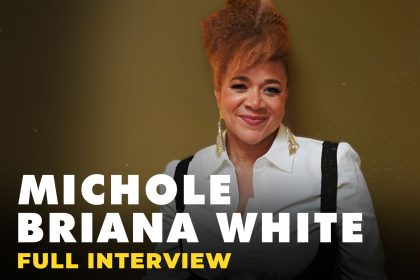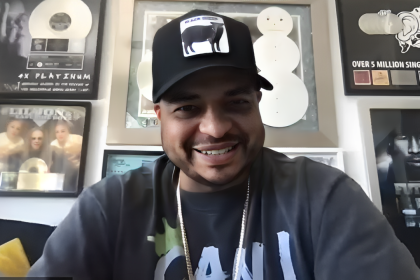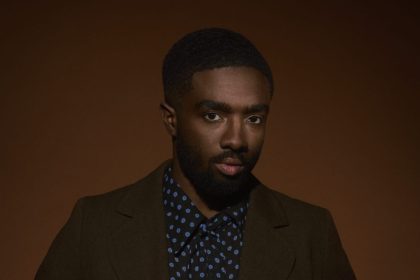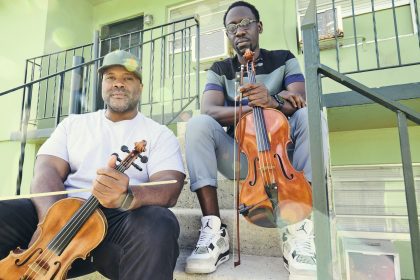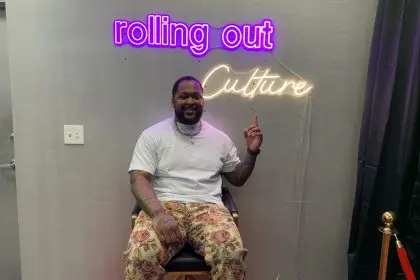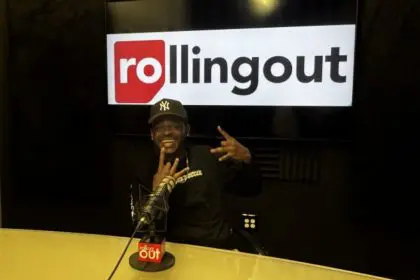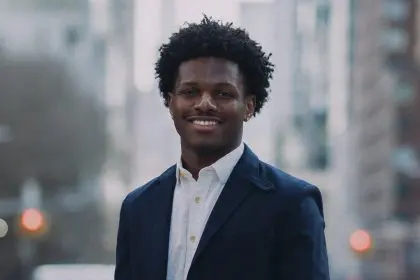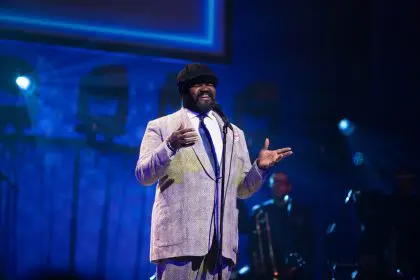In a compelling interview at Star Studio, Tony Award-winning director, actor, and playwright Ruben Santiago-Hudson shares profound insights about Black theatre, cultural heritage, and artistic excellence.
As one of America’s most versatile theatre practitioners, Santiago-Hudson’s work spans from Broadway productions like “Jitney” and “Skeleton Crew” to his groundbreaking “Lackawanna Blues,” where he made history as the first person to write, direct, and star in a Broadway play. His dedication to preserving and elevating Black narratives in theatre has made him a pivotal figure in American theatre.
What responsibility do young actors and directors have when bringing August Wilson’s work to life?
That responsibility, primarily, is to bring your best self to the best rooms that you can possibly get in. And also, you have a lot of people that have paid a lot of dues, paved a strong, solid path for you to walk on, so you gotta walk proudly. But you got to bring your best self to it each time.
How would you describe August Wilson’s creativity and your experience with his work?
When you’re dealing with August Wilson’s work, you first of all got to remember why he wrote it, the kind of man he was, what he stood for and his purpose. He was a cultural anthropologist, the way I look at it. He was digging out the most wonderful parts of being black. Like Ozzie Davis would talk that secret cup of gladness of being black, he celebrated us.
So to do his work you need to celebrate his work. But first and foremost, you need to know the work, know what it’s about – the rhythms, the styles, the people, do the research. If you haven’t been like the first generation next to those people, I happen to be that generation, that first generation next to those that came up from the South.
So, when they brought up all their colored ways of the South, they brought them north, and they stayed colored. They were Northern colored, opposed to Southern colored, but they still were colored. They still, when I say that I mean that this is honestly and unapologetically black. You know the way they danced, the way they spoke, the way they courted, the way they cooked, the way they express themselves. And so, since that was the people raised me, same people that raised August Wilson, I have those same rhythms, and I understand these people intimately.
For those who don’t have direct access to this cultural history, how can they connect with their legacy?
There’s a lot of information out these days. There’s a lot of documentaries. There’s movies like Sounder, and there’s movies like Lead Belly. I would start with the blues. It’s the most clearly documented history of black Americans, because it was ours and undiluted, and we told our stories, Not just, I’m feeling sad today. But when the bowl we took the crop, when I traveled from south to north, when I saw Buddy Bolden, I mean, all these things are in the blues.
So, I would start with documentation and historical artifacts, whether it’s reading, whether it’s clothing, whether it’s music documentaries are always and in documentaries something always gets sacrificed that the person who’s being documented has been cherishing, has been protecting and holding throughout that process.
They have to release it in a documentary, or it’s not true. I would find particularly reading “The Warmth of Other Suns” that tells you about the migration. It’s so many resources. There’s no excuses. And then grandma and grandpa, pop up, grandma, particularly if they’re from south, whether it’s Eastern south. It was eastern southeast Florida, Alabama.
Those people came up to Buffalo, Cleveland, Pittsburgh. And when you talk about Oklahoma, Arkansas, Louisiana, those people went to LA. All Southern, but different Southern people, but all Southern, and wherever your grandparents are from, if they’re from South, sit with them.
Ask them stories. You know, I used to ask Nanny, my mother from Lackawanna Blues, what she cooked in the depression, how did they eat, how did they get full? And I would just sit there and listen to her, sit at the feet of the elders, the people who’ve been there – that’s the resource.
Why did you feel compelled to bring these stories to life?
Because I have to protect it. If I’m not protected, if not, if I’m not the gatekeeper and the custodian of my history, of my heritage, of my people, whose responsibility is it? It’s my responsibility, and I’m the only one that’s going to do it as courageously as it needs to be told, how brilliant and magnificent these people were.
When I say brilliant, I mean in the way they love life, the way they made their heaven on earth, the way they created something out of nothing. It’s brilliance. It’s just knowing how to survive, and mama used to call it mother wit, being smart, being able to think on your feet. That’s how you survive.
And so, right now I’ve been thrust into the seat of some of the elders, because my elders and a lot of my mentors have moved on. Now I’m in a room with Dr. John Kani, South African elder, but an elder, and he brings this history to me, and so it enriches me, empowers me and gives me my assignment.
When an elder looks at you a certain way or whispers in your ear, what should young artists understand about those moments?
What he does, what Dr. Kani does is he fortifies my integrity. He lets me know that this world is bashing me, this banging on me that’s telling me no, don’t come in. He lets me know that no, you have the right to be in, and when you walk in any room you bring in 3,000 ancestors with.
So, he, like today, I gave him a note, and we and he just nods. He doesn’t say anything at the end, when I bring my company around in my circle at the end of thanks, thank everybody for the day, and I give them their message. When he broke the circle, he held my hand a little longer, and he just kind of lightly like punched me, you know, like just tap me. That was all I needed.
Lloyd Richards once gave me the biggest compliment that I had received in a long time. He said, “I went to the theatre, and I saw an actor,” and I did like this, and he said…That’s all he did, and I knew that was my confirmation. That was my armor to go out into this world, and battle and battle and battle, and win.
Has life, particularly for Black people, ever been easy?
No, it’s not gonna get easy. It’s not. Gonna what we have to do is create access for those behind us. When we get into the door, into the room, and you hear people talk about it. But I want to see it in action.
And so, what I do is I create access. And when you look at my artistic team I’m doing this play, Kunene and the King at the Shakespeare Theatre Company in Washington, DC. That is not a black theatre company, but my staff, my set designer, sound designer, costume designer, I’m bringing my people in, and so my associate director.
They now get introduced to a whole new group of extraordinarily competent people of color who show them the way we do things on an extraordinarily high level. The integrity of the work is, like, I said, I have one standard, that’s excellence.
I don’t know nothing else but that. That’s what I’m striving for each day. That’s why I get up. If I was excellent, then I don’t know why I would get up, but striving for it, and some people say I’m excellent. Some people may say this and that. That is not what I want to hear.
I want to hear what I didn’t get right. How I could be better, what I missed. I’m not looking to be praised. I’m looking to be led to, helped to learn, each day is learning. I teach a lot, as you know, as you can hear me talking, and a lot of people look to me to teach, but I’m also seeking information and knowledge each day.
How does the African diaspora influence your work and identity?
This is the difference in my African-ness, and his African-ness is he knows where he’s from. He knew where his great-great grandfather was from, and his great-great-great-grandfather was from. He talks about them. I can’t, and I don’t know where my great-great grandfather was on my mother’s side. My mother was from McKenzie, Alabama.
My father was from Pinuelas, Puerto Rico. I can go back to when the Spanish came over. When I talked to my ancestors there in Puerto Rico. But when I talk to my ancestors, this in Pittsburgh, where my mother from was from, we only can go far back Kansas, Alabama, and I haven’t sent my money to this 23 or that 42, or find out. You put a little spit on the swab. I don’t know if I believe all of it, I would like to know some documented facts of where my people where did they come into America from.
And who are they? I don’t know that. Dr. Kani’s Africanism, his African-ness, knows exactly where he’s from, who his people were, what they wore, and what the songs they sang. I wish I knew.
Why is Shakespeare important for cultural understanding?
The craft. It’s an elevated form of art, and if we take, we can take this white man’s words and master it because they can’t take our work and master it. So, it’s just another level of how hard we work and have to work so we can work. The fact that I’m a Shakespeare actor that I’ve directed at the Delacorte Theatre in New York, the biggest Shakespeare theatre in the country that I have been on that stage and lead roles 3 or 4 times directed as well there, that makes people look back and say, “Man, he does it all.”
And if you’re going to be a craftsman, if you’re going to be fine at what you do. And people like fine things, they like fine food, fine art, fine cars, fine people, fine women, fine men. People want fine things, and they want fine art, fine actors, they appreciate, they respect them. And these actors, who are fine at what they do, penetrate people. They penetrate their hearts and minds, and they give, and if you and if you believe like, I believe, how important it is to honor our ancestors, and when you penetrate them, you change them.
They look at us as, damn. These black people are something. They’re incredible. They are smart, they are smarter. They are better. I love that. I think that scares a lot of people about me, because they know if you come to work with me, you gotta work as hard as me. You can’t work harder. I don’t know if I work any harder. Something probably would happen to me. Cause I work very hard. I get up very early in the morning, and I go to bed. Try to go early, but I’m working. And then, loving my work all day long.
For those without your experience, how would you describe the value of hard work in theatre when the reward might just be a nod?
Well, the payday is the reward and the joy and the pleasure of doing the work. Some people try to do the work to try to get awards. I do the work to get the reward, the freedom of giving and bearing my soul in a place that I’m safe. I cannot bear my soul and all my feelings walking down these streets in America because I’d be looking at looked at as a madman, as a weak man, as an angry man. The things that I am able to do on stage. I can’t do in life.
It is my outlet for expression, wholeness. I can’t do that on TV. I can’t do it in film. I haven’t. But on stage they want all of me. They want the softest, and they want the hardest parts of me. They want the ugliest parts and the most beautiful parts of me, and that’s what theatre provides, and that’s why I stay in the theatre, and every year of my career for the last 50 some years, I’ve been on stage every year, at least once either directing, writing, or acting.
Why is it important that your legacy have such a great body of work and example?
Not to be too ethereal, but because God gave me that, because God blessed me with the wherewithal to be able to do things and not be limited, and not limit myself. And my mother always told me, as long as you put your whole self in. You’re going to be fine at whatever you do. And when I said, Mom, what you mean put my whole self in, she said, don’t half step.
That’s just the way she said it, she said I’m through with it. That means I’m not gonna say it no more. Did you hear that message. I think, because I’ve been blessed to have the facility to be able to write, direct, and act to do them.
I can’t let other people define my space, paint me into a corner, and tell me what they want me to be or what they think I am. I’m the person that looks in the mirror and and says, Ruben, go, you can do that. You are that, and I’ve surrounded myself with a support system, whether it’s my wife, my manager, my publicist, or my business manager. They each believe in me, or they wouldn’t be with me.
They’re the people that that I go to when I when I doubt things, and they’re the people that I respect the most when they tell me, Ruben, that was really wonderful, or you made me cry, or you made me laugh. I believe them. I don’t believe that they were trying to fill me up anything, because they know they want me to do well. And I want to do them proud, particularly my mother, Nanny, and my family.
When you hear Paul Robeson’s name, what comes to mind?
Integrity, power, intellect, courage, those words describe what what Paul Robeson was about. He sacrificed his career and his life for us. People like to talk about the Bible, and people who sacrifice, their story. Everybody know what Jesus did, but they don’t. A lot of people don’t know what our people did.
Whether it was Marcus Garvey or Paul Ruben, or or Malcolm X. Or Dr. Martin Luther King, you know a Philip Randolph, we don’t know who we are. We don’t know the sacrifices that were made to obeyed Rustin. The sacrifices that they have made for us, how they put their lives on the line, and many of them, like Medgar Evers as well, that lost their lives are putting their lives. And they’re just regular common people who did the same thing.
That’s why I wrote a movie called Lackawanna Blues, because Nanny put her life on the line every day and gave everything she had to empower the community and to make us all feel worthy.
All of us that were under her wings, and she sacrificed. We have to pay respect to them. It’s that we just don’t always have to look at the stars and the people that people are talking about who put it on the line. We have to look at, mama. Mama puts it on the line every day for us.
That’s who goes to school when the principal is disrespectful, and or the teacher says something racist, and we go home and say, Mom, guess what they said. Mama put her pocketbook on and put a wig hat on and come on to the school, and the principal got to deal with her. That’s sacrificing, too. That’s standing up. That’s integrity.
What influence did Ozzie Davis have on you?
Ozzie and Miss Ruby, they were like mentors, I mean the knowledge that he gave me. He and I did a few panels, workshops together in white spaces, when we were taught, we were representing black theatre in white spaces, with other white theatre practitioners, and we were talking about creating national theatres and endowing the arts. And I would get very upset and Ozzie, because somebody would say something that was ridiculous, like the National Theatre should be in Iowa, and I’d be like, what about Chicago, LA, New York? What about you know?
What are we talking about? But I would get ready to go off, and Ozzie would under the table, just pat my leg, and then he would start talking, and it would be melodious and low, and kind of like almost lull you to sleep, and it would be like a volcano. It would just come out, and it would be so incredible, and everybody would be mesmerized. Then he would turn to me and say, “Go get ’em young lion.”
Then he would allow me, he would open up that door and pepper it so I can come in and say what I want to say, and be as bold, as strong, as opinionated, as I want it to be, and as succinct. That those kind of lessons, Miss Ruby. Whenever I walk into a room and she see me, she look across the room, she said, “Ruben, come, come, come, sit, sit, sit,” and she would give me an assignment. “We have to do this, or you need to do that.” And she said, “You got your assignment?” She always will say, “Do you have your assignment?” I said, “Yes, ma’am.”
Yes, ma’am, I got my assignment. Same with Dr. Belafonte. Harry Belafonte was the same way as those people, and it goes on and on the people who have given to me. And that’s why I’m always generous about and gracious about my time and the people I spend time with. I mean Moses Gunn and Francis Foster and Douglas Turner Ward, and Lloyd Richards, the people who took a minute for me, and more so. Why? And I asked myself that why.
What would you say to Howard University students about the importance of theatre?
I would say, come and listen and learn, and know that man on stage is representing you. What that person is doing is opening door for you, and it’s a direct link. It’s not like different from you. It is you. It’s for you. So come in, drink it in, take it in, digest it and appreciate it, and stand there and wait so we can come out and talk to you after it’s over, and see how you feel about it and see if we can empower you. The kids need leadership.
The kids need example set. They need to see the sacrifices made, the people who made them, and who are willing to offer knowledge, sustenance, intellectual sustenance, spiritual sustenance to these young people. I just did a workshop with them, with Dr. Kani and Keith David and Phyllis Yvonne Stickney. We just did a workshop for the Howard students, and they performed for us, and we did not critique their performances. We talked to them about their responsibility.
We talked to them about the glory of being able to reach people, to have a bully platform and bully people into knowing how glorious we are. When we good at what we do, it’s almost like bullying, and they don’t even know it’d be like that. We make them witness. We testify when we do our art.
I have a saying, I tell kids, I say, “Your art is your song of immortality.” You live forever through your art. So, make sure when you walk on stage, that’s what you believe, and that’s what you’re representing, like mama say, don’t half step.

